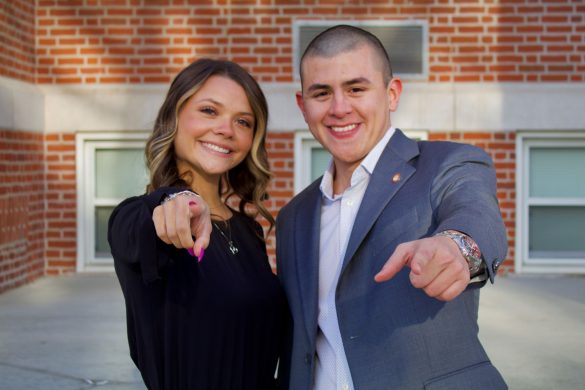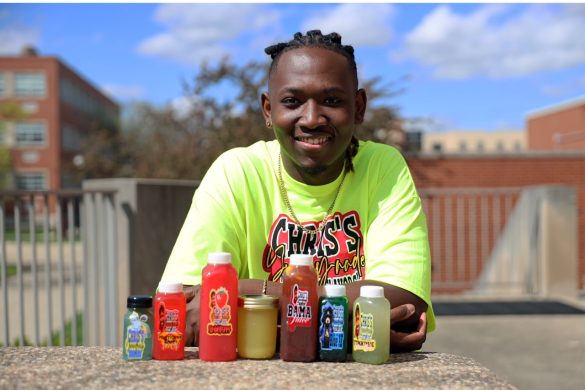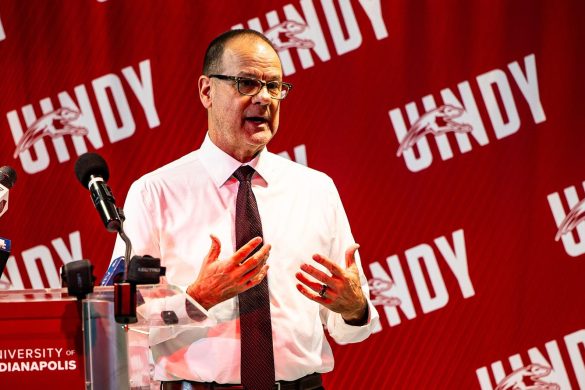The Indiana General Assembly, made up of 50 state senators and 100 house representatives, convened on Jan. 3 for the 2019 legislative year. Indiana legislators will meet in committees for 61 days to discuss and determine bills. This year, 1,348 bills are being introduced or amended and updated. Of those bills, approximately 25 will make it out of committee and become law, according to Assistant Professor of Political Science Laura Merrifield Wilson.
“We estimate that every state legislator proposes 10 to 12 bills in a legislative session, [and] only 25 of those will become laws,” Wilson said. “Legislators do things to get headlines, and to have favors from constituents. There are a lot of things that will motivate a legislator.”
Not every bill will be passed, and those that will pass would not immediately impact University of Indianapolis students. Bills such as School Bus Safety and School Curriculum do not pertain to UIndy students. However, according to Wilson, the tobacco and e-liquid bill, or Senate Bill 425, would have the biggest impact on UIndy students. Co-authored by Sens. Randall Head, James Merritt and Ed Charbonneau, the bill, will raise the legal age of purchasing tobacco products, e-liquids and electronic cigarettes containing nicotine from 18 to 21 years of age, with some exceptions. Those who are at least 18 on June 30, 2019 may continue to hold a retailer’s permit until it expires. Those who are at least 18 years of age on June 30, 2019 or those who are serving in the armed forces or reserves, or veterans discharged or separated from the services under conditions other than dishonorable may continue to purchase tobacco products, e-liquids and electronic cigarettes.
Of people 18 to 24 years old, 13.1 percent smoked cigarettes in 2016, according to the Centers for Disease Control and Prevention. In Indiana, 18.6 to 21.8 percent of people smoked cigarettes in 2016, according to the CDC. In 2017, 19.6 percent of high schoolers were using some sort of tobacco product. If this bill is passed, it would reduce the number of 18 to 20 year who smoke in Indiana, according to Wilson.
Another bill that may impact UIndy students is Senate Bill 90, authored by Sen. James Merritt. The Immunity Under the Lifeline Law currently “provides immunity for the crimes of public intoxication, minor in possession, minor in consumption and similar laws, to persons who identify themselves to law enforcement while seeking medical assistance for a person suffering from an alcohol-related health emergency,” according to the current law. The bill, as it stands now, however, does not protect those under the influence of drugs. Senate Bill 90 will attempt to change that by adding protections to those looking for medical assistance if they possess drugs or drug paraphernalia.
One of the better-known bills being reintroduced in this session of the Indiana General Assembly is the Hate Crimes Bill, or House Bill 1020. This is not the first hate crimes legislation to be introduced in Indiana.
“The hate crimes legislation is vitally important for the state overall because Indiana is one of five states that does not have it on the books,” Wilson said. “It went through the legislature last year but died in committee.”
In June 2018, anti-Semitic graffiti was found on a Hamilton County synagogue in Carmel, Indiana. After Nazi Flags and Iron Crosses were spray painted at the synagogue, Governor Eric Holcomb spoke out against the act and called for hate crimes legislation.
“There are a lot of people on both sides that support the idea of hate crimes legislation.”
“The governor spoke out against the defacement, and [the bill] has a lot more political support now, but the question is what will be included. I think that is an important one that students should pay attention to as well,” Wilson said.
According to Wilson, the only thing preventing the bill from being passed is whether or not it will include protections for people of differing sexual orientations. In previous years, when Indiana introduced bills such as the Religious Freedom Restoration Act, or RFRA, it passed in 2015. While this bill originally was religious based, it became a question of whether or not it would allow businesses to discriminate against gay couples. The bill made national headlines, with Apple’s CEO Tim Cook speaking out against it. This history of questioning and not protecting those of differing sexual orientations is now extending into this year’s hate crime legislation, according to Wilson.
“There are a lot of people on both sides that support the idea of the hate crimes legislation. But the question is what to include in the bill, in a state that, five years ago, had the Religious Freedom Restoration Act debacle. And so there are people who say, ‘We shouldn’t include sexual orientation; we don’t believe that should be a protected class,’” Wilson said. “They will clash with some other folks who say, ‘Hate crimes should cover all identities, and that should include sexual orientation.’”
In the current Indiana General Assembly, Republicans hold a supermajority in both the House and Senate in Indiana. According to Wilson, socially conservative Republicans will want to exclude people of differing sexual orientations, while financially conservative Republicans will not have a preference. So the divide may not be along party lines, but perhaps in the Republican Party’s ideology.
“I think it depends on whatever group gets excluded,” Wilson said. “Meaning if they include people of sexual orientation, how can they appease, or what else can they do for, social conservatives that would convince them to vote on allowing sexual orientation to be included, or vice versa.”
Another controversial bill is House Bill 1384, or the Medical Marijuana Bill, which “permits the use of medical marijuana by persons with serious medical conditions as determined by their physician,” and “establishes a medical marijuana program to permit the cultivation, processing, testing, transportation, and dispensing of medical marijuana by holders of a valid permit,” according to the Indiana General Assembly’s website.
Authored by Rep. Jim Lucas, the bill will be the first of its kind in Indiana. However, Wilson does not believe it will pass.
“I don’t expect it will pass, but that’s another interesting one, like with CBD oil that did pass. And so people say ‘Oh well, this could be the next step; this could be the next thing.’ I believe it would be pretty contested,” Wilson said.
The sale of CBD, or cannabidiol, oil became legal in March of 2018 after being signed into law by Gov. Holcomb. This law allows the sale of CBD oil as long as it meets labeling requirements and contains no more than 0.3 percent THC. Because CBD oil can contain THC, the main compound found in cannabis, which produces the drug’s “high,” some believe medical marijuana will legalized according to Wilson.
“A lot of people feel strongly about medical marijuana, and they may be trying to get the people on their side,” Wilson said. “I am not sure what is going to happen at the end of 2019 but this gets the conversation going; And they’re hoping to move forward, do the best they can, make adjustments, and maybe they’ll come up with suggestions and modify the bill and to keep at it every single year.”
The Indiana General Assembly’s last day for adjournment of both houses is April 29, which means bills must be passed before this date and the end of the 2019 session.









